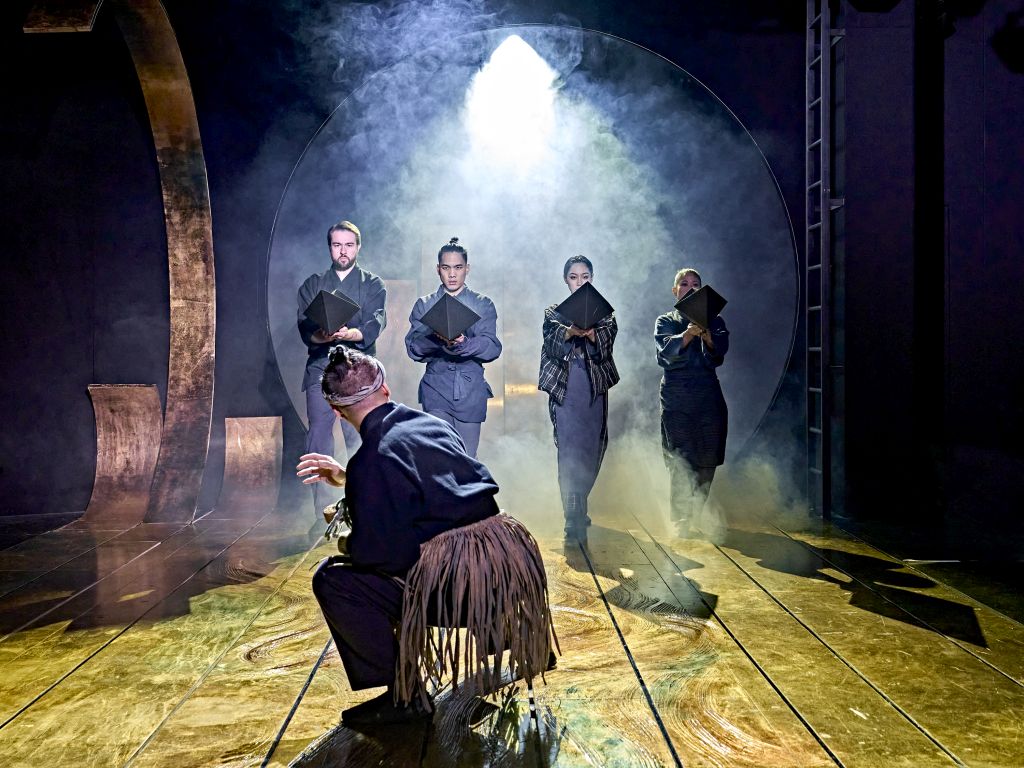This is, by my reckoning at least, the third major London production over the years of Pacific Overtures, Stephen Sondheim and John Weidman's dazzling curiosity of a show first seen on Broadway in 1976 and reappraised ever since in stagings both large and small both sides of the Atlantic.
London first encountered the piece at ENO, of all places, in 1987, and, in 2003, it was done with contrastingly intimacy at the Donmar Warehouse. And whatever else one may say about the new Menier Chocolate Factory revival, Matthew White's production boasts one of the most ravishing sets I've yet come across at this modest-seeming yet ever-ambitious address. Understated yet elegant, witty and even politically trenchant, Paul Farnsworth's design is a thing of wonder and plays a significant part in amplifying our understanding of a sometimes-tricky piece. I gasped at a first sighting of its bronzed, burnished splendour in a traverse staging that reveals itself anew right up to the very end.
A co-production with Japan's Umeda Arts Theatre, where the show played both Tokyo and Osaka in the spring, this is certainly the angriest, most furious take on the material that I've encountered to date. And why not: at a time when fissures and fractiousness, and worse, are the geopolitical order of the day, the rhetorical question posed by the musical's final song, "Next," casts a decisive chill. Who is next indeed to be taken over by the roiling fury that would seem to be the global world's shared lot? The late Edo-period Japan envisaged at the start would suggest differently. The show's opening number, "The Advantages of Floating in the Middle of the Sea," posits a contemplative, serene nation at some remove from a world elsewhere said to be "crumbling" and "rumbling": "Out there blood flows / who knows," the song asks, only for Pacific Overtures to bring such realities forbiddingly close to home across nearly two hours, the piece here performed with cuts (and without an interval). The point is, everyone knows the dangers around us by this show's poignant close, which embraces AI as part of a visual shorthand that the composer-lyricist, who died two years ago last month, could have never imagined.
The late Edo-period Japan envisaged at the start would suggest differently. The show's opening number, "The Advantages of Floating in the Middle of the Sea," posits a contemplative, serene nation at some remove from a world elsewhere said to be "crumbling" and "rumbling": "Out there blood flows / who knows," the song asks, only for Pacific Overtures to bring such realities forbiddingly close to home across nearly two hours, the piece here performed with cuts (and without an interval). The point is, everyone knows the dangers around us by this show's poignant close, which embraces AI as part of a visual shorthand that the composer-lyricist, who died two years ago last month, could have never imagined.
One can't emphasise enough the bravery of this show then and now, the issue now being one of potential cultural appropriation that wasn't a talking point 50 years ago but which is here forestalled by the presence of an Asian cast and by the director White's ability to fuse Japan and the West together in a discomfiting view of realpolitik that takes no prisoners.
As is made clear in an excellent programme essay by the show's book writer John Weidman (with additional material by Hugh Wheeler), the Hal Prince-directed original coexisted with a Broadway that at the time was hosting Hello, Dolly! just streets away: Prince's Kabuki-inflected approach had to hold its own amidst the likes of the high-kicking A Chorus Line that defined New York theatre at the time.
Such pressures aren't felt this time out, which accounts in part for the excision of "Chrysanthemum Tea", a cherishable song (at least by me) doomed stylistically inappropriate, so out it has gone. That still leaves as rich a score as Sondheim ever wrote, performed at a theatre that has blazed its own path with this artist - their Jamie Lloyd-directed Assassins was a thing of wonder, whilst the Maria Friedman-directed Merrily We Roll Along has landed this season on Broadway as a resounding commercial success, which is about the last thing one would have expected from that title 42 years ago.
Very much in evidence are "Four Black Dragons," in which the locals look forbiddingly at the arrival of the American ships as a portentous figure of doom, and "Someone in a Tree," a favourite song of Sondheim's and a neat encapsulation about what it means to pay witness to history: Masashi Fujimoto and Jon Chew (the latter cast as the Reciter, the show's resident emcee) do it proud.
You're beguiled one minute, blindsided the next. "A Bowler Hat" is a playlet in itself in its study of cultural assimilation and transference, as here performed by Takuro Ohno's Kayama, the Prefect of Police. "Pretty Lady", meanwhile, lands especially disturbingly as interest in a perceived geisha takes a cruel turn in a song that finds an unexpected complement in Sondheim's subsequent Broadway entry, Sweeney Todd, and its song "Pretty Women". (One only wishes at times for greater clarity of diction but that may come with playing in, and increased familiarity with Jonathan Tunick's vaunted orchestrations here conjoined with Paul Bogaev's musical direction.)
Will this show travel the onward path taken by Merrily and the Menier's A Little Night Music? Difficult to say of material cut from entirely different thematic cloth, though Sondheim's spiritual father, Oscar Hammerstein II, of course cast his own eastward gaze towards Siam/Thailand with The King and I. For now, think of the production as a fitting homage to an artist who died two years ago last month and whose career was continually devoted to the "next" as here repaid with the nod of a bowler hat - and infinitely more.















Add comment